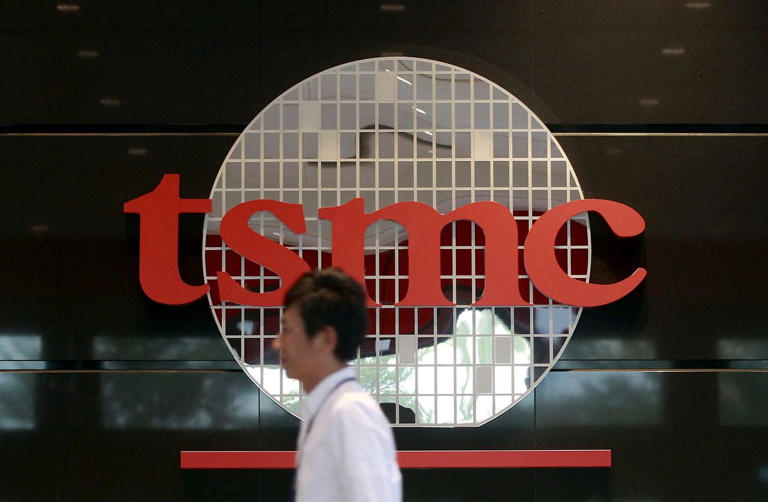Shares of Taiwan Semiconductor Manufacturing (TSMC) experienced a significant decline as investors reacted to the chip maker’s cautious industry outlook, overshadowing its positive first-quarter financial results.
TSMC, the world’s largest contract chip manufacturer, saw its shares drop by as much as 7.2% early Friday, marking the largest daily percentage decline since October 2022. This sharp decline in TSMC’s stock, a heavyweight in the market, also dragged down the Taiwan benchmark Taiex by 3.5%.
Despite reporting better-than-expected first-quarter results driven by increased demand for advanced chips amid global enthusiasm for artificial intelligence (AI), TSMC’s outlook for the semiconductor industry raised concerns among investors. While the company’s quarterly net profit rose by 8.9% year-on-year, breaking a three-quarter declining streak, its cautious industry outlook dampened market sentiment.
TSMC now anticipates semiconductor industry growth, excluding memory chips, to be around 10% for the year, compared to its previous projection of “more than 10%” three months ago. Additionally, the company revised down its 2024 foundry industry growth outlook to a mid-to-high teen percentage from the earlier projection of 20%.
During an earnings call, TSMC’s CEO C.C. Wei highlighted ongoing macroeconomic and geopolitical uncertainties that could potentially impact consumer sentiment and end-market demand. The chip sector, which faced an industrywide inventory glut post-pandemic in 2023, is expected to see robust demand from the high-performance computing segment, including AI chips. However, demand from other segments, particularly the automotive sector, is forecasted to remain weak, with TSMC now expecting a contraction instead of an increase.
While analysts anticipated the weaker guidance, citing previous warnings from companies like Mobileye Global about an auto chip supply glut, they remain optimistic about TSMC’s long-term prospects. Despite the lowered industry growth projections, TSMC maintains its revenue growth guidance in the low-to-mid 20% range in U.S. dollar terms, buoyed by strong demand for AI-related chips.
Overall, despite short-term market volatility, analysts believe TSMC is well-positioned to capitalize on its solid industry position, particularly in advanced nodes and AI demand, making it a long-term winner in the semiconductor industry.
Expanding on the context, TSMC’s decline in share value reflects broader concerns about the semiconductor industry’s growth trajectory. The industry has been grappling with various challenges, including supply chain disruptions, geopolitical tensions, and a global shortage of semiconductor chips. These factors have contributed to uncertainty surrounding future demand and production capacity.
Furthermore, TSMC’s cautious outlook highlights the complex dynamics at play within the semiconductor market. While certain segments, such as high-performance computing and AI, continue to drive demand for advanced chips, other sectors, such as automotive, face headwinds that could impact overall industry growth. This nuanced understanding of market dynamics underscores the importance of TSMC’s strategic positioning and its ability to adapt to changing market conditions.
In addition to industry-specific factors, TSMC’s performance is also influenced by broader economic trends and geopolitical developments. Ongoing macroeconomic uncertainties, including inflationary pressures and supply chain disruptions, pose challenges to consumer sentiment and overall market stability. Moreover, geopolitical tensions, particularly between major economies like the U.S. and China, can have ripple effects on global trade and investment patterns, impacting companies like TSMC that operate in the international market.
Despite these challenges, analysts remain optimistic about TSMC’s long-term growth prospects. The company’s strong financial performance, technological leadership, and strategic investments in key growth areas position it favorably to capitalize on emerging opportunities in the semiconductor market. Moreover, TSMC’s commitment to innovation and its ability to adapt to evolving market trends reinforce its status as a key player in the global semiconductor industry.
